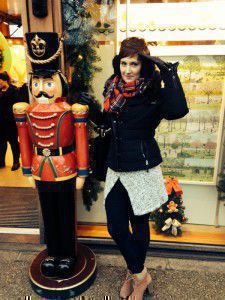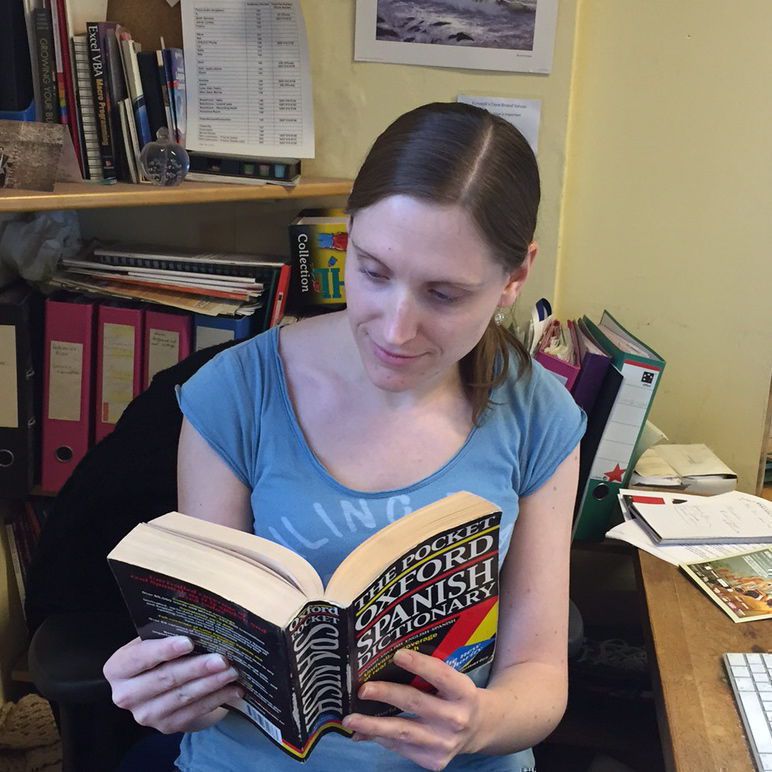How do you know when you’re fluent in another language?
The other day, in a moment of idle curiosity, I took an online Spanish test. And it went rather well; when I finished, I was told that I was 87% fluent.
This is very funny, because – to my shame – I haven’t spoken Spanish properly for years. And although the test proved that everything I learnt at school and university is still there in my head, I know the next time I do try and have a conversation, I’ll struggle initially to remember the right words and how to construct sentences correctly. And there’ll definitely be a lot of ‘um’ and ‘er’.
Defining yourself as ‘fluent’ or ‘not’ seems like a simple enough task. Personally, I’d define fluency as the moment you’re able to have a conversation in another language without hesitation, just as you would in your own native language.
But is that setting too high a standard for myself? Surely what I’ve just described is one step on – what we would call native level?
So, I asked a few other EuroTalkers how they define fluency. A couple of responses were very much like mine:
“When you’re able to have a conversation (spoken or written) without making mistakes, without having to pause to think about words and grammar and without referring to a dictionary or other ‘cheat-sheets’. Be able to use the more complex features of a language with ease (e.g. conditionals, obscure tenses).”
“Speaking another language without having to think about it.”
While a couple were willing to be a bit more flexible:
“When you have enough of the language to get through a visit to the country, you can understand a local and they can understand you back when you speak their language.”
“I think minor mistakes are permitted as long as the other one understands you.”
And another one came at the question from an angle I’d never considered:
“You’re able to have any conversation about general knowledge, not specific fields like medicine, for example.”
But there was one thing all the answers seemed to have in common: the key to fluency is confidence, whether you know all the words or not. And that’s why I can’t think of myself as 87% fluent in Spanish; yes, I understand how the subjunctive works, and perhaps I’d even say that I can read the language fluently – but that doesn’t mean I can confidently have a conversation with someone about the weather.
What do you think ‘fluent’ means? Are you fluent in any other languages?
Liz
What language does the voice in your head speak?
In today’s day and age, a great percent of the people travel, either for vacations, business or even a longer period of time, in search of a better job, better opportunities, to be with the loved ones and why not, just for the sake of a multi-cultural experience. While some of us learn a new language as a hobby or in school, migrants find that it is difficult to live in a country whose language you can’t speak. So this is where we get to the point of this article: how does it feel to speak another language than your native one, every day with everyone.
 First of all, let me take you on a history trip back in the ‘90s. No, we’re not going to listen to Backstreet Boys, instead I’m going to tell you how our generation got to learn English from TV back in Romania. There was a single cartoon program back then, Cartoon Network, and it wasn’t dubbed in Romanian (like it is now), nor did we have subtitles. So we’d just watch the cartoons without completely understanding what they were saying (not that there was much conversation, but still) and I would occasionally ask my parents what does this/that mean. From the age of eight we’d eventually start learning English in school, but by then it already sounded familiar and we would only add the grammar to the equation.
First of all, let me take you on a history trip back in the ‘90s. No, we’re not going to listen to Backstreet Boys, instead I’m going to tell you how our generation got to learn English from TV back in Romania. There was a single cartoon program back then, Cartoon Network, and it wasn’t dubbed in Romanian (like it is now), nor did we have subtitles. So we’d just watch the cartoons without completely understanding what they were saying (not that there was much conversation, but still) and I would occasionally ask my parents what does this/that mean. From the age of eight we’d eventually start learning English in school, but by then it already sounded familiar and we would only add the grammar to the equation.
Growing up, we had daily contact with American English from movies and music and by the time I finished high school I’d already got a certified advanced level.
So I was quite confident in my English; I got the chance to use it for both of the jobs I had in the years I worked in Romania, and I got along really well with the people I’d have to speak in English on the telephone or in meetings.
Last year, when I moved to London I was rather surprised to find that I couldn’t understand what these people were saying. I panicked at first but then I realised that no one is expecting me to be 100% fluent in English so I started asking questions or asking people to repeat so that I can understand properly. As I said, most of the English vocabulary I had was American, so I started picking up the differences like, ‘mug’ not ‘cup’, ‘biscuits’ not ‘cookies’ and ‘fringe’ not ‘bangs’.
At first I found it quite exhausting, and at the end of the day I wasn’t able to concentrate anymore or to use more complex words. With time, I got used to it and I started learning more and more words and expressions that I would afterwards try to use in conversations (like for example ‘I’m skint’, which means ‘I’m broke’). Also, in the first months here, I used to get nervous at the supermarket or whenever a unexpected conversation would start, fearing that I won’t find my words or that I wouldn’t remember certain things. With time, I started gaining more confidence and now, after ten months, I am easily able to have a conversation, express my feelings and ideas accurately and understand almost all what the other person is saying. I still have trouble understanding different English accents, and I would probably see myself stuck in a conversation about, let’s say, gardening tools – so certain topics with a specific word-pool.
You know how in your native language you can express your feelings and state of mind by the words you choose and by your tone of voice? Well, good luck doing that when you only know a single set of words for each thing. Also, studies have shown that sometimes people find that they can speak more freely in a non-native language because they don’t feel that the words ‘really’ belong to them, they’re not ‘their’ words.
But what happens when you spend more than half of the day speaking a different language? Your brain starts to associate certain situations, new situations that you didn’t have to deal with in your home-country, with a certain language – this is when you start to ‘think’ in another language. Some people associate this moment with the moment you start to feel like you belong to a certain culture, that your roots are starting to clench to the ground and now you’ve become (or at least moved closer to being) one of ‘them’.
So I’ve found myself in situations in which it was easier for me to express myself using an English word rather than a Romanian one, either because I found that it sounded better or because I couldn’t think of a proper translation.
It’s funny how the brain works sometimes – I got a call at work today from a business partner that also speaks native Romanian, so naturally I started talking to her in Romanian and found it very difficult to find the right words or to build the sentences without sounding stupid. I felt like I had to do a reverse-translation of what I would normally say in English.
At the end of the day, I can agree that using multiple languages really does wonders for your way of thinking and for the structure of your thoughts. Like Nelson Mandela once said, ‘If you talk to a man in a language he understands, it goes to his head. If you talk to him in his language, that goes to his heart.’
Ioana
My big fat Greek mistake!
Learning a language can sometimes be fraught with problems when you try to put your new-found skill into action (like ordering the wrong thing in a restaurant), but even if you really are fluent in a language it can still backfire on you.
Some 25 years ago, when I was finally fluent in Modern Greek and often being mistaken for being a true Athenian Greek, I used to travel to all parts of Greece at a moment’s notice with my children, or with friends – no advance bookings, we’d just get the air tickets to Athens and decide which island to go to once we arrived. My knowledge of the Greek language always stood us in good stead and we seldom had problems. It also meant that we were offered much hospitality by the Greeks, who are such welcoming and lovely people to know.
One day, back here in the smoke, a friend took me to a Greek restaurant he’d found in Bayswater, and it was a terrific place. A musician played the bazouki, we danced a lot, the food was wonderful and we spent the whole evening speaking English and Greek alternately. When my friend asked for the bill, the manager came over and asked us whether we were English or Greek, because he’d heard us speaking both languages and he was puzzled as to our nationality. When he discovered we were both English but had learned to speak Greek at home with books and cassettes, but without formal lessons, he was very impressed. So impressed that he offered us anything on the menu as a gift. It was not difficult for me to choose. I absolutely love halva. That was my selection. I hadn’t remembered that the halva you get in a Greek taverna is not the halva that you’d buy in the shops. Instead, it’s made with semolina and it’s the one I don’t like!
Needless to say, when it was served to me I couldn’t find it in me to turn it away, so I ate as much as I was able to. I thanked him profusely and then said I was full up, having already eaten three courses before it, and this was accepted by the manager. No big deal, you might think. However, more than six months later I returned to that Greek restaurant and took with me a male relation who was in London on a visit, thinking it was unlikely that I’d be remembered especially as I was with someone else and there would be no Greek spoken that evening.
Imagine my chagrin when, at the end of the meal and with nothing being said about it, the halva was presented to me once more. I couldn’t believe it. I ate it manfully (or perhaps it should be womanfully) and made up my mind to not go back there any more. It was such a pity because their hospitality was second to none.
What would you have done?
Gloria


